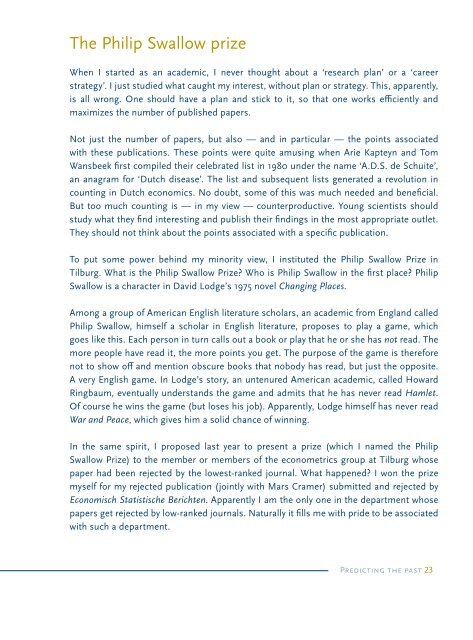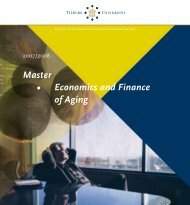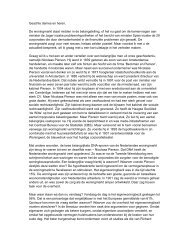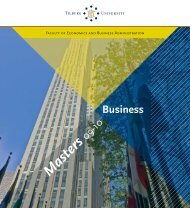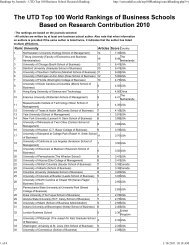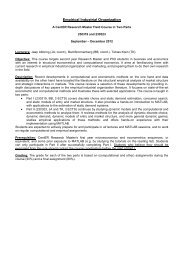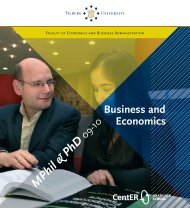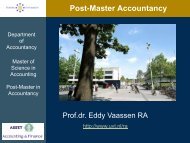Predicting the past - Tilburg University, The Netherlands
Predicting the past - Tilburg University, The Netherlands
Predicting the past - Tilburg University, The Netherlands
You also want an ePaper? Increase the reach of your titles
YUMPU automatically turns print PDFs into web optimized ePapers that Google loves.
<strong>The</strong> Philip Swallow prize<br />
When I started as an academic, I never thought about a ‘research plan’ or a ‘career<br />
strategy’. I just studied what caught my interest, without plan or strategy. This, apparently,<br />
is all wrong. One should have a plan and stick to it, so that one works efficiently and<br />
maximizes <strong>the</strong> number of published papers.<br />
Not just <strong>the</strong> number of papers, but also — and in particular — <strong>the</strong> points associated<br />
with <strong>the</strong>se publications. <strong>The</strong>se points were quite amusing when Arie Kapteyn and Tom<br />
Wansbeek first compiled <strong>the</strong>ir celebrated list in 1980 under <strong>the</strong> name ‘A.D.S. de Schuite’,<br />
an anagram for ‘Dutch disease’. <strong>The</strong> list and subsequent lists generated a revolution in<br />
counting in Dutch economics. No doubt, some of this was much needed and beneficial.<br />
But too much counting is — in my view — counterproductive. Young scientists should<br />
study what <strong>the</strong>y find interesting and publish <strong>the</strong>ir findings in <strong>the</strong> most appropriate outlet.<br />
<strong>The</strong>y should not think about <strong>the</strong> points associated with a specific publication.<br />
To put some power behind my minority view, I instituted <strong>the</strong> Philip Swallow Prize in<br />
<strong>Tilburg</strong>. What is <strong>the</strong> Philip Swallow Prize? Who is Philip Swallow in <strong>the</strong> first place? Philip<br />
Swallow is a character in David Lodge’s 1975 novel Changing Places.<br />
Among a group of American English literature scholars, an academic from England called<br />
Philip Swallow, himself a scholar in English literature, proposes to play a game, which<br />
goes like this. Each person in turn calls out a book or play that he or she has not read. <strong>The</strong><br />
more people have read it, <strong>the</strong> more points you get. <strong>The</strong> purpose of <strong>the</strong> game is <strong>the</strong>refore<br />
not to show off and mention obscure books that nobody has read, but just <strong>the</strong> opposite.<br />
A very English game. In Lodge’s story, an untenured American academic, called Howard<br />
Ringbaum, eventually understands <strong>the</strong> game and admits that he has never read Hamlet.<br />
Of course he wins <strong>the</strong> game (but loses his job). Apparently, Lodge himself has never read<br />
War and Peace, which gives him a solid chance of winning.<br />
In <strong>the</strong> same spirit, I proposed last year to present a prize (which I named <strong>the</strong> Philip<br />
Swallow Prize) to <strong>the</strong> member or members of <strong>the</strong> econometrics group at <strong>Tilburg</strong> whose<br />
paper had been rejected by <strong>the</strong> lowest-ranked journal. What happened? I won <strong>the</strong> prize<br />
myself for my rejected publication (jointly with Mars Cramer) submitted and rejected by<br />
Economisch Statistische Berichten. Apparently I am <strong>the</strong> only one in <strong>the</strong> department whose<br />
papers get rejected by low-ranked journals. Naturally it fills me with pride to be associated<br />
with such a department.<br />
<strong>Predicting</strong> <strong>the</strong> <strong>past</strong> 23


